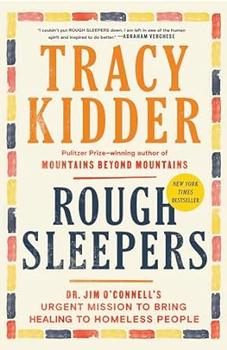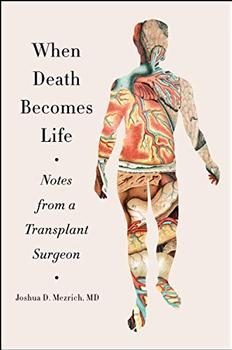Summary | Excerpt | Reviews | Beyond the book | Read-Alikes | Genres & Themes | Author Bio

Dr. Jim O'Connell's urgent mission to bring healing to homeless people
by Tracy KidderPulitzer Prize-winning author Tracy Kidder's Rough Sleepers follows the career of Dr. Jim O'Connell, a Harvard-educated physician who has spent over 30 years providing care to Boston's unsheltered community.
In 1985, as O'Connell was finishing his residency at Mass General, he was asked ("conscripted," in his words) to spend one year building a program called "Health Care for the Homeless." Sponsored by a grant from the Robert Wood Johnson Foundation, it was a trial to determine if the "poorest of the poor" could be integrated into the city's mainstream medical care system. He quickly realized that the program's patrons "seemed to believe that by 1990, when the grants ended, the big problems of health care for the homeless would be solved," but it was obvious to him that the root causes of his patients' misery weren't being addressed. "How do you treat HIV in a person who has no place to live?" he asks, "How do you treat diabetes in patients who can't even find their next meals?" After just one year working with this population O'Connell decided to spend his career addressing these issues to the best of his ability.
Kidder's portrait of O'Connell is vivid, painting his subject as a caring individual who is both frustrated and fascinated by his profession. He chronicles the doctor's journey from his first enthusiastic but naïve efforts to his becoming savvy about getting care to his patients, even if he has to use unconventional methods to do so (he decides, for example, to leave some patients' medications with a bartender who agreed to make them take their pills before giving them a drink). It's a finely-tuned portrayal that avoids the temptation of casting the physician as overly saintly or heroic; his flaws are evident, as are his strengths, and as a result, readers feel they know O'Connell well by the book's end.
The author also helps his audience understand how complicated the issue of homelessness truly is. He writes about a presentation he attended where a slide "displayed in sequence the forty-two different steps that six agencies and a landlord had to complete to get one homeless veteran housed." In another example, he quotes O'Connell as saying, "I like to think of this problem of homelessness as a prism held up to society, and what we see refracted are the weaknesses in our health care system, our public health system, our housing system, but especially in our welfare system, our educational system, and our legal system – and our corrections system." The author makes it clear that there's no easy solution. He does include statistics and demographic data, but the information is widely distributed throughout the narrative, keeping it from getting bogged down in facts and figures.
As the book progresses, Kidder gradually shifts focus from O'Connell to the individuals he has come to know through his profession, such as Santo, a man who'd been homeless for 40 years, and BJ, who lost both legs due to infections from frostbite. The author takes a deep dive into the life of Tony, another long-time resident of the streets who had been unable to find housing after serving 17 years in prison, and it's through Tony's experiences that we begin to understand the unrelenting trauma of homelessness. The book as a whole is fascinating, but it's these individuals' stories that make the narrative truly affecting and unforgettable.
Kidder spent many hours joining O'Connell in his clinic as well as on the "house calls" he made to his most vulnerable patients – van trips at night to the alleys and doorways where he knew they'd be sleeping. Toward the end of Rough Sleepers, he makes it clear these experiences left him a changed person. "[A] certain coffee shop," he writes, "was no longer just a place to get a good muffin, but also the shop across the street from where Harmony and Jake liked to camp, with their caravan of shopping carts and roller bags…Certain sights had acquired meaning—walking up Bromfield Street around dawn, I saw a man in a janitor's uniform sloshing a bucket of water across the pavement of a doorway, and I wondered if I knew the person who had spent last night on that patch of concrete." And I think that might encapsulate the main takeaway from this book; after reading it, I felt I had a better understanding of the issue and had developed more empathy for those experiencing homelessness – the "rough sleepers" in my own neighborhood. I think it should be required reading, and it's one of those books I find myself wanting to discuss with others, so it would make an excellent book group selection. I highly recommend it to all audiences, particularly those wishing to know more about this complex topic.
![]() This review was originally published in The BookBrowse Review in February 2023, and has been updated for the
February 2024 edition.
Click here to go to this issue.
This review was originally published in The BookBrowse Review in February 2023, and has been updated for the
February 2024 edition.
Click here to go to this issue.

If you liked Rough Sleepers, try these:

by Carol Mithers
Published 2025
Rethinking Rescue boldly confronts two of the biggest challenges of our time — poverty and homelessness — in asking the question: Who deserves the love of a pet?

by Joshua D. Mezrich
Published 2020
A gifted surgeon illuminates one of the most profound, awe-inspiring, and deeply affecting achievements of modern day medicine - the movement of organs between bodies - in this exceptional work of death and life.
Your guide toexceptional books
BookBrowse seeks out and recommends the best in contemporary fiction and nonfiction—books that not only engage and entertain but also deepen our understanding of ourselves and the world around us.